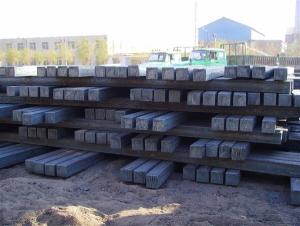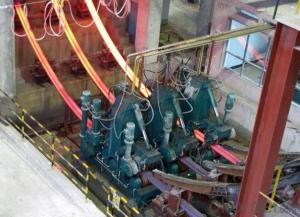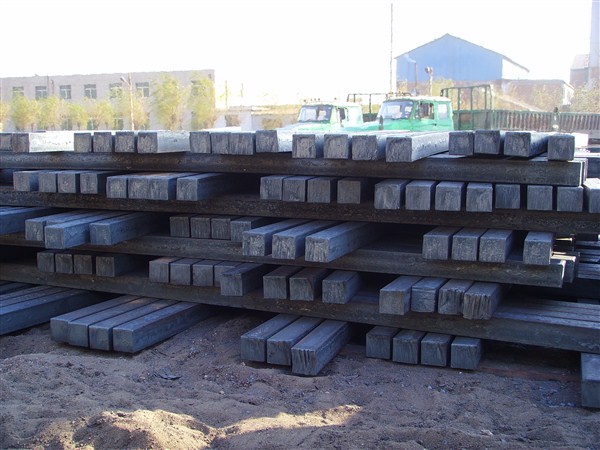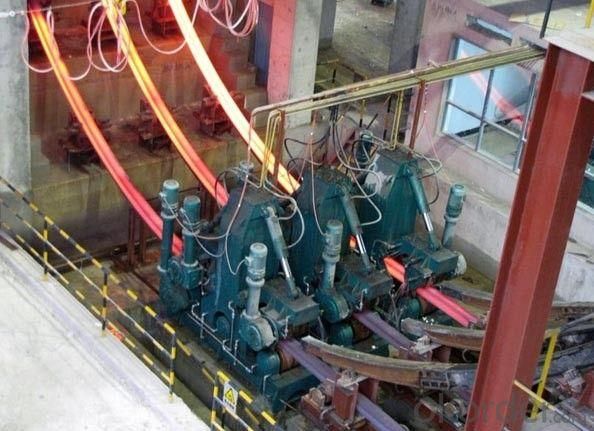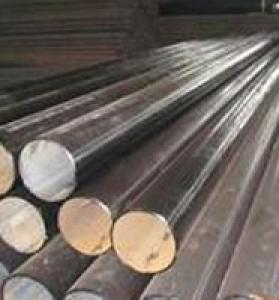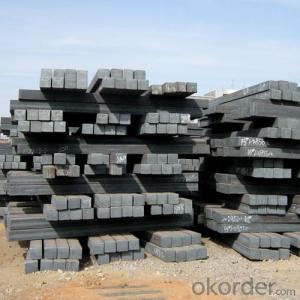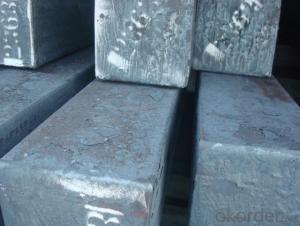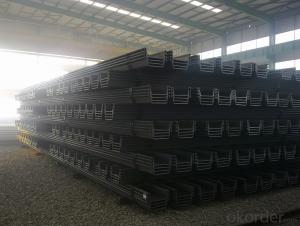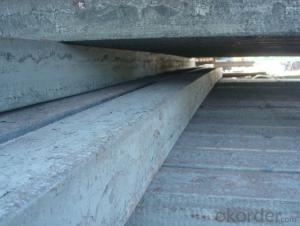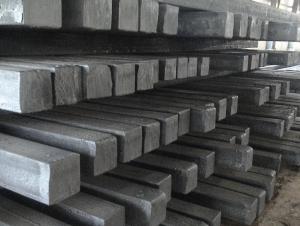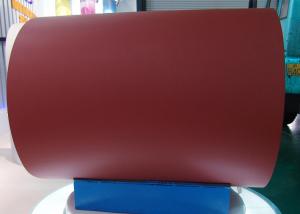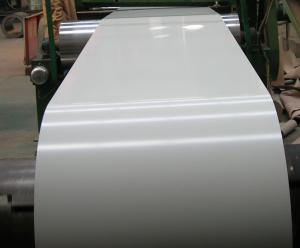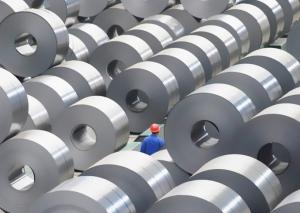Steel Billet
- Loading Port:
- China Main Port
- Payment Terms:
- TT OR LC
- Min Order Qty:
- -
- Supply Capability:
- -
OKorder Service Pledge
OKorder Financial Service
You Might Also Like
Packaging & Delivery
| Packaging Detail: | in bundles |
| Delivery Detail: | according to the quantity |
Specifications
square steel billet
1.3SP, 5SP
2.terms of payment: L/C at sight
3.size: 120*120mm
4.length: 5.8~12m
square steel billet
Specifications
square steel billets
1)We procure world class quality steel billets which meets the specific requirements of the clients
The Billets produced by the company can be broadly divided into three main types i.e.
M.S. Billets
CRS Billets
Special Alloy Billets
M.S. Billets are used for rolling of TMT Re-Bars of Fe415 and Fe500 Grade and various other structural steel products.
CRS Billets are used fro rolling of CRS TMT Re-Bars.
Special Alloy Billets are used for rolling of any special grade TMT Re-Bars like Earthquake resistant TMT Re-Bars and for special grade structural steel products.
The following are the sizes of Billets available with Shyam Steel Industries Ltd.:
100 X 100
120x120
150 X 150
Physical Properties:
Description | As per IS 2830 | Shyam Billets |
| Bend (max.) | 5 mm per meter | >= 5 mm per meter |
| Carbon (max.) | 3mm per meter | >= 3 mm per meter |
| Length | 3 mt - 13 mt | 3 mt - 9 mt |
Chemical Properties:
Ladle Analysis: | ||
Designation | Carbon | Manganese |
| C15 | 0.12-0.18 | 0.30-0.60 |
| C18 | 0.15-0.21 | 0.30-0.60 |
| C20 | 0.17-0.23 | 0.30-0.60 |
| C15 MMn | 0.12-0.18 | 0.60-1.00 |
| C18 MMn | 0.15-0.21 | 0.60-1.00 |
| C20 MMn | 0.17-0.23 | 0.60-1.00 |
| C15 HMn | 0.12-0.18 | 1.00-1.50 |
| C18 HMn | 0.15-0.21 | 1.00-1.50 |
C20 HMn | 0.17-0.23 | 1.00-1.50 |
Billets of different designations are manufactured in three different grades namely A, B, C having sulphur, phosphorous content (on ladle analysis) and carbon equivalent as follows:
| Chemical Analysis: | |||
| Grade | Sulphur | Phosphorous | Carbon Equivalent (CE)1 |
| Max | Max | Max | |
| A | 0.05 | 0.05 | 0.42 |
| B | 0.045 | 0.045 | 0.41 |
| C | 0.04 | 0.04 | 0.39 |
- Q: How is steel plate formed into seamless pipes?
- Steel plate is formed into seamless pipes through a process called hot rolling. In this process, a steel plate is heated and then passed through a series of rolling mills to gradually reduce its thickness and shape it into a cylindrical form. The edges of the plate are then welded together to create a seamless pipe.
- Q: How is steel rebar welded for reinforcement in concrete structures?
- Steel rebar is welded for reinforcement in concrete structures using a process called "rebar welding." It involves heating the ends of the rebar using an electric arc, creating a molten pool. The molten ends of the rebar are then pressed together, allowing them to fuse and form a strong and continuous bond. This welding technique ensures that the rebar maintains its integrity and provides the necessary reinforcement for the concrete structure.
- Q: What are the advantages of using steel in the manufacturing of security doors and windows?
- The advantages of using steel in the manufacturing of security doors and windows include its high strength, durability, and resistance to forced entry. Steel is a robust material that can withstand harsh weather conditions and physical attacks, offering enhanced protection against burglaries and break-ins. Additionally, steel doors and windows provide excellent fire resistance properties, making them a reliable choice for ensuring the safety and security of homes and commercial buildings.
- Q: What are the advantages of using steel products in construction?
- There are several advantages of using steel products in construction. Firstly, steel is incredibly strong and durable, allowing for the construction of sturdy and long-lasting structures. Secondly, steel is a highly versatile material that can be easily manipulated and fabricated to meet specific design requirements. Additionally, steel is fire-resistant, providing a higher level of safety compared to other materials. Moreover, steel is recyclable, making it an environmentally-friendly choice. Lastly, steel structures are often cost-effective due to their efficiency in construction and maintenance, making them a popular choice in the industry.
- Q: What are the different types of steel brackets and their uses?
- There are several types of steel brackets used in various applications. Some common ones include angle brackets, corner brackets, T-brackets, and U-brackets. Angle brackets are used for providing structural support and reinforcement at corners or joints. Corner brackets are specifically designed for strengthening and aligning corners. T-brackets are used to connect two perpendicular components, while U-brackets are used to secure objects in place. Each type of bracket has its own specific use and is chosen based on the requirements of the project.
- Q: What are the applications of steel in the defense industry?
- Steel is widely used in the defense industry for a variety of applications. It is utilized in the construction of military vehicles, such as tanks and armored personnel carriers, providing them with the necessary strength and durability to withstand harsh environments and ballistic threats. Steel is also used in the manufacturing of firearms and ammunition, ensuring their robustness and reliability. Additionally, steel is employed in the construction of military-grade infrastructure, including fortifications, bunkers, and naval vessels, which require high levels of protection and resilience. Overall, steel plays a crucial role in enhancing the defense capabilities and safety of armed forces worldwide.
- Q: How are steel products used in the manufacturing of packaging materials?
- Steel products are commonly used in the manufacturing of packaging materials due to their strength and durability. Steel can be used to create various packaging components such as cans, barrels, and drums. These steel packaging materials are widely used in industries such as food and beverage, chemicals, and pharmaceuticals to protect the contents from damage, contamination, and external factors. Additionally, steel packaging is recyclable, making it an environmentally-friendly choice for packaging solutions.
- Q: How does steel pipe coating for oil pipelines work?
- Steel pipe coating for oil pipelines works by applying a protective layer to the surface of the pipe to prevent corrosion and damage. The coating can be made of various materials such as epoxy, polyethylene, or polypropylene, which provide a barrier against moisture, chemicals, and abrasion. This helps to extend the lifespan of the pipe and ensures the integrity of the oil pipeline, reducing the risk of leaks and environmental hazards.
- Q: What are the factors to consider while selecting steel products for a specific application?
- When selecting steel products for a specific application, there are several factors to consider. These include the required strength and durability, corrosion resistance, cost, availability, and the specific conditions and environment in which the steel will be used. Additionally, factors such as the required shape, size, and weight of the steel product, as well as any special properties or certifications needed for the application, should also be taken into account.
- Q: What are the applications of steel mesh in security fencing?
- Steel mesh is commonly used in security fencing due to its high strength and durability. It provides a robust barrier that is difficult to breach, making it ideal for securing residential, commercial, and industrial properties. The small openings in the mesh allow for visibility and airflow, while still preventing unauthorized access. Additionally, steel mesh can be easily customized to fit different spaces and can be combined with other security measures such as barbed wire or electronic systems for enhanced protection.
Send your message to us
Steel Billet
- Loading Port:
- China Main Port
- Payment Terms:
- TT OR LC
- Min Order Qty:
- -
- Supply Capability:
- -
OKorder Service Pledge
OKorder Financial Service
Similar products
Hot products
Hot Searches
Related keywords
